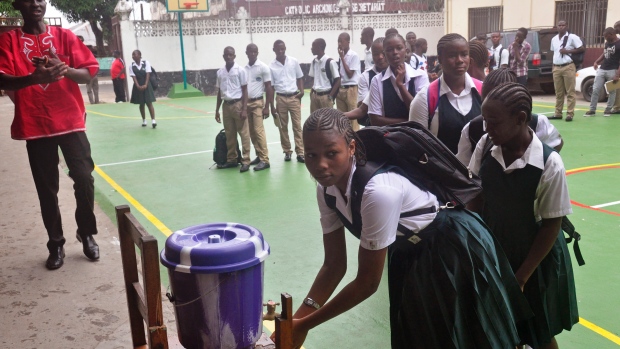Across the three countries, there have been no reported cases of a student or teacher being infected at a school since strict hygiene protocols were introduced when classes resumed at the beginning of the year after a months-long delay caused by the virus. In Liberia, two schools were decontaminated as a precaution following the death of a student in June 2015 and the infection of another in July 2015.The protocols, developed by UNICEF and its partners, include taking the temperature of children and staff at the school gate and installing handwashing stations. They also involved the distribution of millions of bars of soap and chlorine, and the training of tens of thousands of teachers and administrators in the protocols and in providing psychosocial support.Establishing and implementing the protocols across three countries required months of preparations.
“The massive effort that went into making schools as safe from Ebola transmission as possible appears to have paid off,” said Geoff Wiffin, UNICEF Representative in Sierra Leone. “Children learned in school how to protect themselves and others from Ebola, and they passed on those messages to their parents and their communities. This played an important role in the battle against the epidemic.”
Some five million children lost months of education as schools remained closed from July 2014 until the first months of 2015 in the three worst-affected countries, which already had poor education numbers. Before Ebola, 58 per cent of children attended primary school in Guinea, 34 per cent in Liberia and 74 per cent in Sierra Leone.
UNICEF is working to ensure the Ebola-prevention protocols remain in place after the holidays, while supporting efforts to make education systems more resilient, by addressing issues such as low enrolment, shortages of quality teachers, and access to safe water. Only 33 per cent of primary schools have access to water in Guinea, 45 per cent in Liberia, and some 40 per cent in Sierra Leone. Maintaining safe hygiene practices and standards will also be important in protecting children from other illnesses.
Due to the success of the measures, Guinea-Bissau has begun implementing similar protocols as a precaution, after people who had been in contact with an infected person in neighbouring Guinea were believed to have crossed the border and could not be tracked down.
“As we battle to get to zero cases, we also must think of the future. Major investments are needed to ensure that schools have basic water and sanitation infrastructure,” said Sheldon Yett, UNICEF Representative in Liberia.
###
Note to editors:
Guinea
School Closed: 8 August 2014
Schools to reopen: After 11 October elections (tentative)
Teachers trained in Ebola prevention: 80,657, including 15,931 trained by UNICEF.
Schools equipped with Ebola prevention hygiene package: 12,455 (100 %), including 7,176 provided by UNICEF.
Liberia
School Closed: 31 July, 2014
Schools to reopen: 7 September 2015
Teachers trained in Ebola prevention: 10,000, including 5,995 trained by UNICEF.
Schools equipped with Ebola prevention hygiene package: 4,619 (105 %), all provided by UNICEF. (Includes some schools that were not registered)
Sierra Leone
School Closed: 17 July 2014
Schools to reopen: 31 August 2015
Teachers trained in Ebola prevention: 18,338, including 8,997 trained by UNICEF.
Schools equipped with Ebola prevention hygiene package: 8,995 (99 %), including
3,472 schools with hand-washing kits by UNICEF, who provided all schools with soap and cleaning materials
###
Photos and video can be downloaded from: http://uni.cf/1xZAb39
About UNICEF
UNICEF promotes the rights and wellbeing of every child, in everything we do. Together with our partners, we work in 190 countries and territories to translate that commitment into practical action, focusing special effort on reaching the most vulnerable and excluded children, to the benefit of all children, everywhere.
For more information about UNICEF and its work visit http://www.unicef.org/
Follow us on Twitter and Facebook.
For further information, please contact:
Timothy La Rose, UNICEF Guinea: tlarose@unicef.org +224 622 350 251
Rukshan Ratnam, UNICEF Liberia: rratnam@unicef.org +231 7702 67110
John James, UNICEF Sierra Leone, jjames@unicef.org +232 76 102 401
Tim Irwin, UNICEF West and Central Africa, tjirwin@unicef.org +221 77 529 1294
Melanie Sharpe, UNICEF New York msharpe@unicef.org +1 917-251-7670

